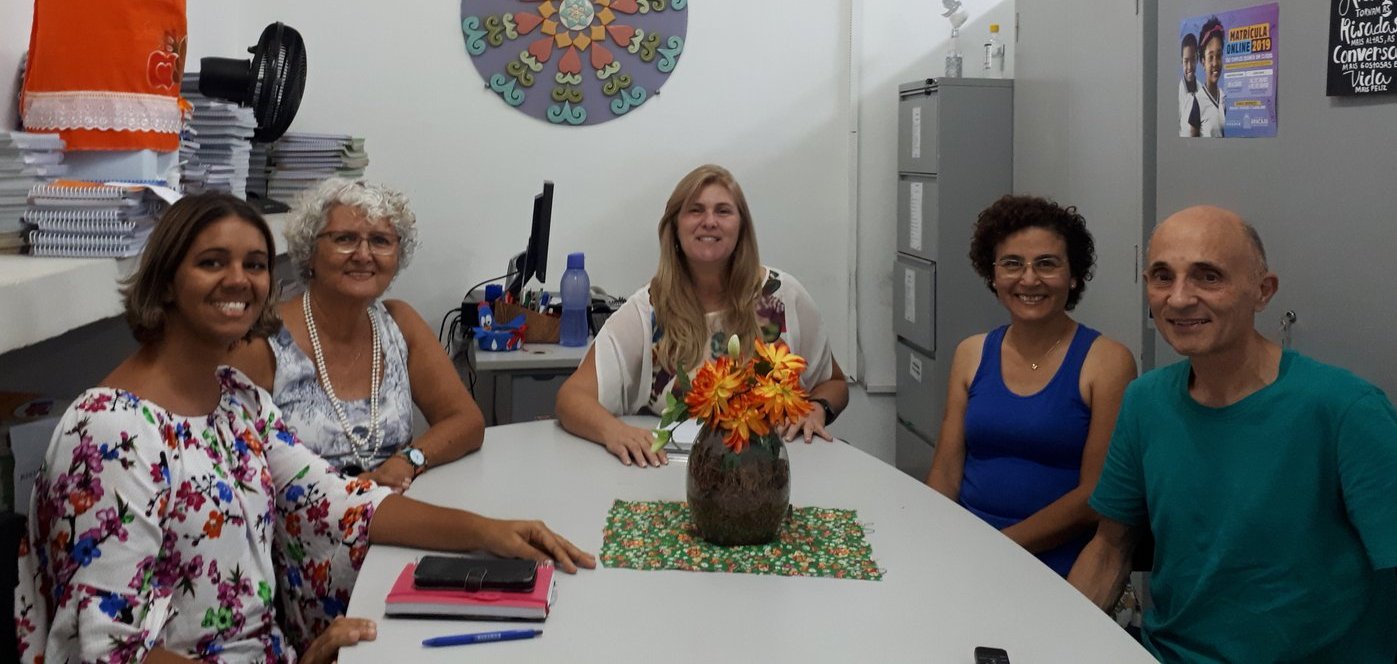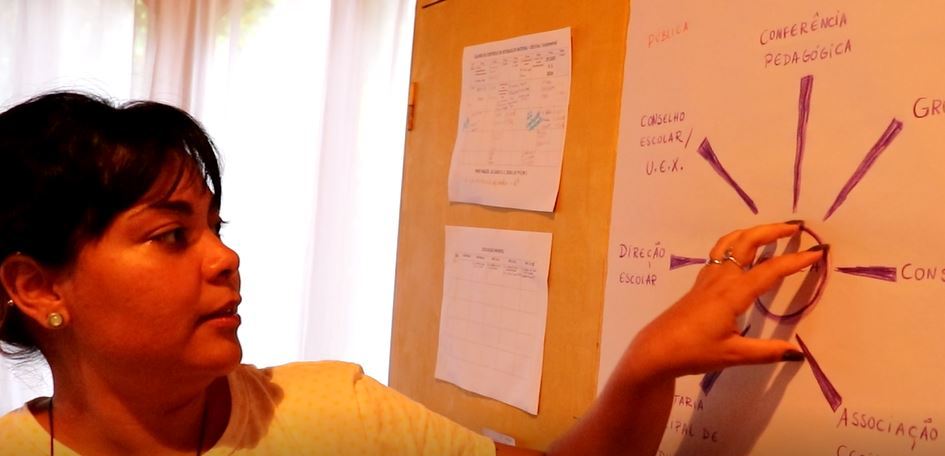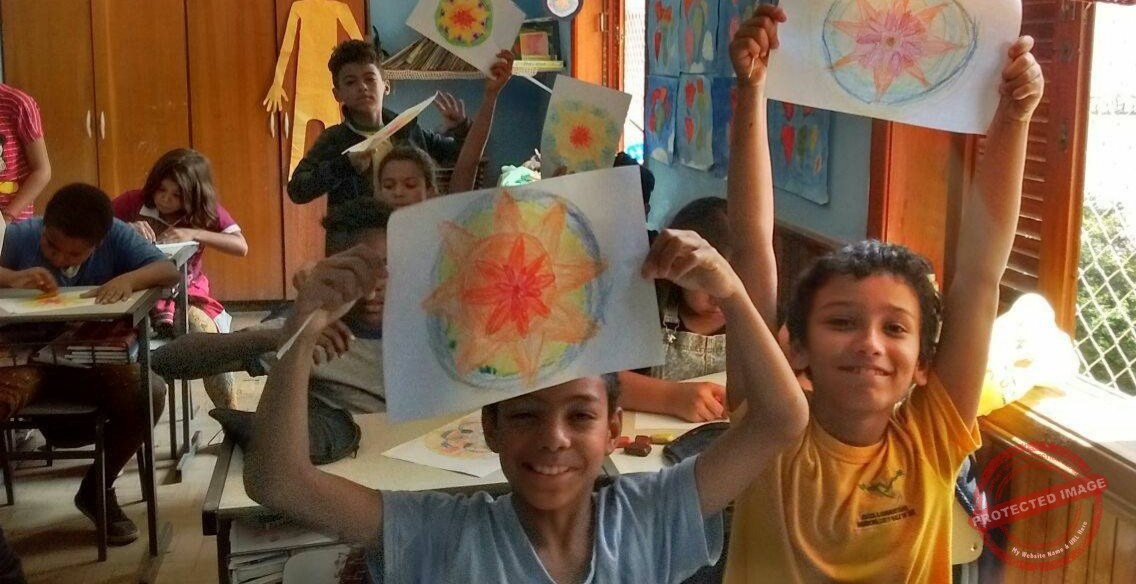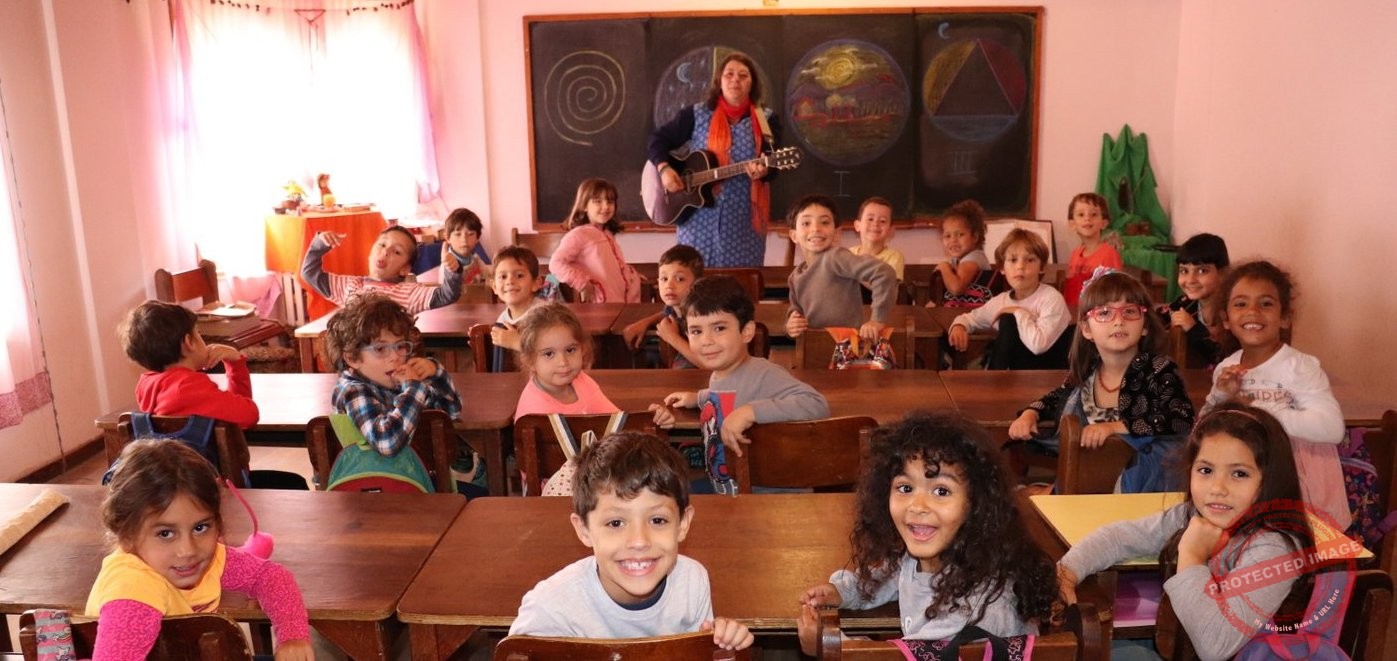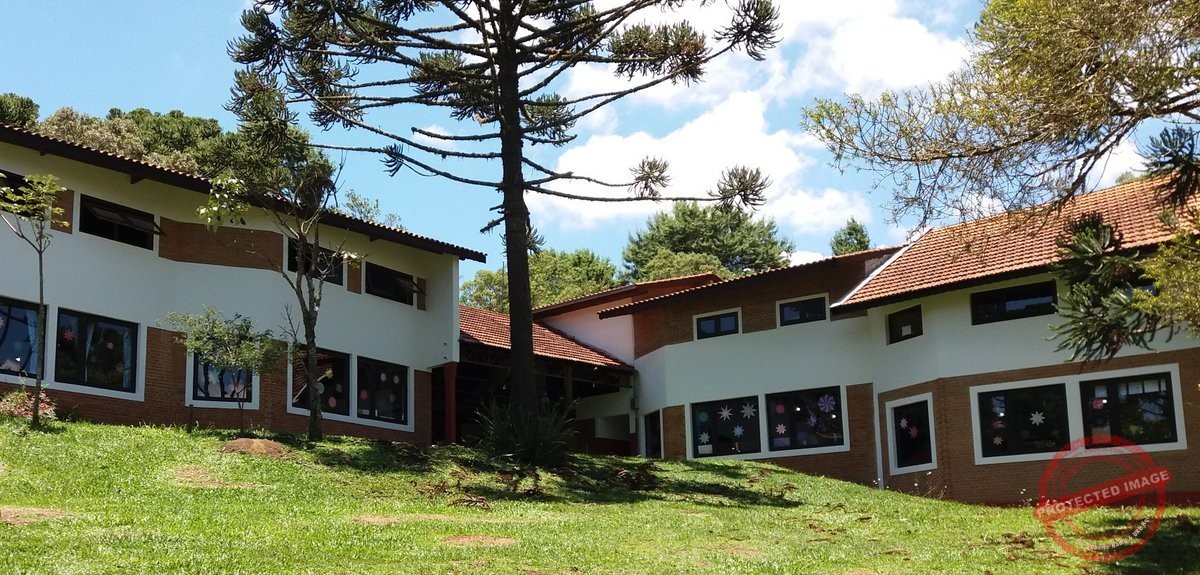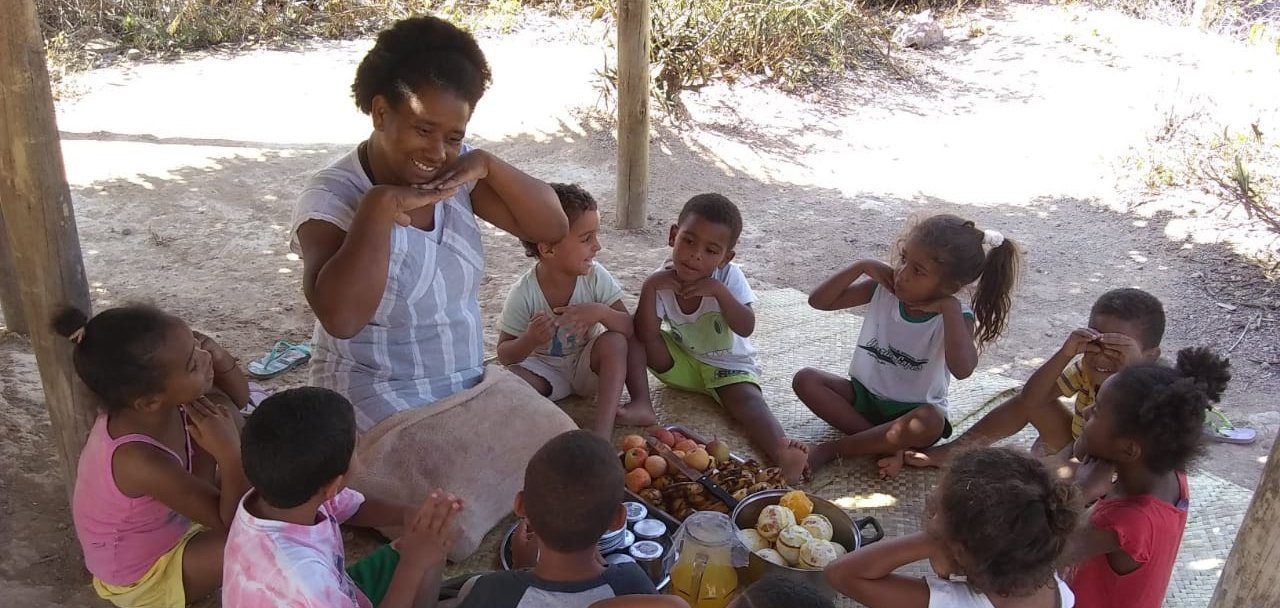[print-me target="body"]
The Waldorf Pedagogy
in public school
history – challenges – perspectives
by Rubens Salles and Rosineia Fonseca
Aracaju SE
We arrived in Aracaju on 04/18/2019 to visit two public schools that are starting to apply Waldorf Pedagogy and were welcomed by the couple Maria Aparecida do Nascimento Dias (whom we affectionately call Cida) and Paulo do Eirado Dias Filho, who are responsible for the Instituto Social Micael ISM. The creation of these two schools was the result of long-term work carried out by them. The ISM provided us with accommodation in Aracaju.
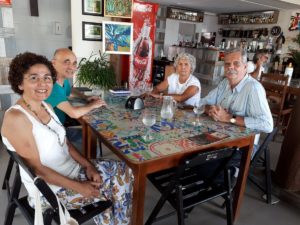
From left to right, Rosineia Fonseca, Rubens Salles, Maria Aparecida do Nascimento Dias and Paulo do Eirado Dias F°
At Cida's suggestion, we arrived in Aracaju during a module of the training course for Waldorf teachers, held by ISM, where we would meet with teachers from public Waldorf schools in other cities and states. It was a great opportunity for us, as we were unaware of some of these initiatives. We met teachers from Escola Murundu (Palmeiras BA), Escola Anael (Várzea da Roça BA) and Flor de Araçá (Conde PB), and a mother of a student from Escola Casa da Mata (Mata de São João BA).
highlights
1 – The EMEI Dr. José Calumby Filho was the first public school of origin to officially adopt the Waldorf Pedagogy in Brazil, and the fact that it was created during the public administration of a government and had its project maintained by the successor administration, demonstrates that the project went very well. built.
2 – This case proves how important it is to have more centers for training Waldorf teachers, as it was based on the interest of a group of teachers from the city of Aracaju that the project was proposed and carried out. It all started with a request for support from the municipality to fund Waldorf training, and then progressed to the implementation of a pilot school. The project started with an EMEI, and now the students graduating from this kindergarten already have an EMEF where they can continue their elementary education inspired by Waldorf Pedagogy.
3 – Instituto Social Micael has an important role in the region and has already trained over 100 Waldorf teachers. We met and interviewed several teachers who have already graduated and others who are still studying, all of whom are very happy to have known and been able to practice this pedagogy. In Aracaju, a very promising Waldorf movement is taking shape.
4 – A fundamental factor is having people like Maria Aparecida and Paulo, who know Waldorf Pedagogy in depth, and have all the arguments to help convince public managers to accept the challenge of supporting a project with a pedagogy that is still little known and is very different from the conventional. Taking the public manager to visit Waldorf schools that were already established also helped to create greater interest in the project.
5 – After the opening of the two schools, many other educators got to know a little about pedagogy and became interested in learning more. Several started the training course with the support of the city hall, thus creating a virtuous circle that will take this humanizing education to more and more teachers, children and families.
Some basic data about the municipality of Aracaju SE
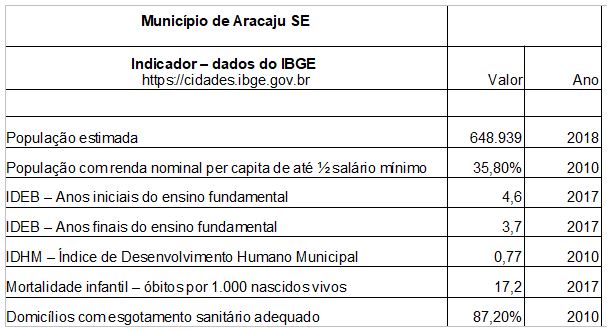
People interviewed
Michael Social Institute
Maria Aparecida do Nascimento Dias
Paulo do Eirado Dias Filho
Federal University of Sergipe
Professor Dr. Jose Americo de Menezes
Municipal Secretary of Education
Maria Cecília Tavares Leite – Secretary of Education of Aracaju SE
Núbia Lira – Child Education Coordinator
Ana Débora Lima França – Elementary School Coordinator
EMEI Dr. José Calumby Filho
Antonielia Ribeiro Santos Fontes – former director
Simone Lima – director
Márcia Soares Ramos Alves – coordinator
Maria José Vieira de Almeida – teacher
Mayra Cristina Oliveira de Araújo – teacher
Cassia de Fatima – teacher
EMEF Jose Souza de Jesus
Rivânia Rocha – coordinator
Beatriz Lima Andrade – teacher
Cleide Selma da Hora Santos – teacher
Rita Nilda Santos de Santana – teacher
Xislene Santos do Nascimento – teacher
The Michael Social Institute
As a result of Maria Aparecida's enchantment with Waldorf Pedagogy, Paulo's unconditional support and the effort of several collaborators and admirers, equally passionate about pedagogy, the impulse that led to the creation of Instituto Social Micael began in 1991, when Cida began to teach a based on Waldorf Pedagogy, which was called Micael Center for Arts and Development. He also worked with juvenile delinquents, together with Fundação Renascer. It was a long road until 2003, when the Instituto Social Micael ISM was formalized. Its objectives include the publication of books, environmental protection, promotion of Biodynamic Agriculture and realizing the dream of acting to improve the quality of life of the Human Being through Education. He had important support from Gerard Bannwart, and worked with prominent representatives of the anthroposophical movement, such as Rudolf Lanz, Ute Craemer, Waldemar Setzer and Sônia Setzer, among others.
Located in Aracaju, SE, the ISM has trained more than 100 Waldorf teachers in two classes, each with 1,600 hours (4 years). The course is recognized as a lato sensu postgraduate course, in partnership with Faculdade São Luís de França (SE). Students from the most different regions of the country have already attended these courses, most notably the states of Bahia, Alagoas, Pernambuco, Paraíba, Ceará, Pará and Piauí. The Institute seeks to support the implementation and operation of Waldorf initiatives in these regions, adding its experience to the resilience and determination of these new social entrepreneurs.
The ISM has already promoted other courses based on Anthroposophy, such as: Curative Pedagogy (1,900 hours, in partnership with UFS – Federal University of Sergipe); Biodynamic Agriculture (470 hours, in partnership with the University of Uberaba – UNIUBE/MG and Instituto ELO-SP); Germinar+ (150 hours – two classes in partnership with Instituto ECOSOCIAL-SP).
Currently, the ISM hosts the Micael Branch, the Superior Study Class, the Micael de Aracaju School (Child and Elementary Education from 1st to 5th grade), and the publishing house Edições Micael, focused on the work of Rudolf Steiner.
The construction of the Waldorf movement in Aracaju
The movement to strengthen Waldorf Pedagogy in Sergipe began with the Curative Pedagogy course held in partnership with the Federal University, which began in 2003 and lasted 5 years. On that occasion, two professors nominated by the university's pedagogy department participated in the course, one of whom, professor José Américo de Menezes, is a partner and active member of the ISM until today, maintaining a very important academic link, with the support, including, of the university's rector. A group of his students does an internship at EMEI Dr. José Calumby Filho, where the Waldorf Pedagogy is being implemented, and participate in a group of the ISM Waldorf teacher training course, especially for public school teachers.
Since the beginning of the ISM training courses, teachers from the municipal public network began to participate. In the second half of 2013, this group asked for help from Cida and Paulo to obtain financial support from the city hall to take the course. She tells this story like this:
city – I went there several times to present to the secretary Márcia Valéria Lira Santana what the course was, what Waldorf Pedagogy was. I took material from students, objects, notebooks, and one of those times, I think the fifth time, all with a scheduled audience, she made me a proposal and said: 'I already understand what you want to tell me. I am understanding that a teacher alone is not enough. I'm going to propose that you bring all these teachers together in one school and if you work right, you will work in that school only and exclusively with the Waldorf pedagogy.' I was hearing something I really wanted and didn't even believe it was true. I had no connection with the city hall and I was alone. I said: Can I invite the teachers, arrange another audience with you and you explain what this idea is? She said, 'Can'. I left happy, bouncy. Then I went with the teachers on the appointed day. And I said: I want to ask a question: Do you know what you are proposing? She said, 'I know. I've read, I've researched a lot, every time you came here. Work right, because I know that everything passes and governments pass. If you don't have protection, another management can come and end. If you work properly, I'll send a bill to the City Council, defining that only Waldorf pedagogy can work in that school.' I said: So we have to race against time to work, and that's what we did.
Cida went to São Paulo with the secretary of education to visit the pedagogical exhibition at Colégio Micael, and she was delighted with the curriculum and the work of students and teachers, and participated in activities at the school. His technical vision allowed us to understand how human development is promoted by the Waldorf curriculum. It was chosen to implement the project in a school that was under construction in the 17 de Março neighborhood, on the outskirts of the city. While waiting for the school to be ready, the teachers continued studying and making the “trousseau” for the school, building ornaments, toys, dolls, etc. They went to visit the school weekly, until on April 10, 2017, EMEI Dr. José Calumby Filho had his inaugural class.
At that time there was a very remarkable event, which was the painting of the school wall, measuring 210 meters, which was all decorated with drawings with appropriate motifs for young children. This painting, based on a strategy developed by Instituto Social Micael, was made with the participation of the local community, including graffiti artists residing in the neighborhood. It's a sensational story, which you can get to know in text or video attached.
When a wall brought people together – pdf text
The history of the wall in VIDEO
The importance of partnership with government
Cida believes that if she had not had the support of the municipal management, none of this would have happened. So, you should have a lot of gratitude, a lot of recognition, because a manager in an executive position in education has a great demand for work, as he is responsible for a large-scale work. It is not easy to study and reflect on new proposals and pedagogies under these circumstances. So we should always recognize when these opportunities happen and be very grateful for that trust.
The school was inaugurated, the bill did not take effect, and after the 2016 elections the opposition took over the mayor's office, but the project was preserved. In March 2018, under the current municipal management, EMEF José Souza de Jesus was inaugurated, which is a neighbor to EMEI Dr. José Calumby Filho, and this is where the children who attend this school go when they reach the age to move on to the first year of elementary school. Both schools have several teachers attending Waldorf training, they have pedagogical advice from the ISM, and these schools are gradually transforming.
Paul – These are acts of daring. On the one hand, a management had the courage to implement a different pedagogy in an unprecedented way in Brazil, based on a movement that came from within the network itself, from a group of interested teachers. And in the current management there is also a courage in the sense of maintaining a project that was born in the antagonistic management and this we also understand as being a very republican process, very civilized, giving continuity and an act of responsibility with the community. And as this has been happening, because it has been more than two years, we can already see that the community of the 17 de Março neighborhood is transforming the schools into the social center of the neighborhood. Everything is inside. Everything happens around the school, and that's a wonder! There have already been evening meetings with more than 100 families. Cida adds: “In front of the school there is a family clinic. The family doctor, on Father's Day, gave a lecture at the school on men's health. We don't celebrate Father's Day, we celebrate Family Day."
The current education secretary, Maria Cecília Tavares Leite, whose interview you can watch in the attached video, also went to São Paulo with Cida to visit Waldorf schools, such as Escola de Resiliência Horizonte Azul and Escola Rudolf Steiner. Thus, as demonstrated, implementing a Waldorf school in a public network requires a lot of determination and work, and with a lot of respect and understanding for the performance of the public manager.
Another very important achievement of this long-term work can be seen in the normative resolution 5/2015, of the State Council of Education of Sergipe, which establishes how the Political Pedagogical Projects of schools should be structured. Among the various guidelines, the document gives examples of pedagogical concepts that can support PPPs, including Waldorf Pedagogy among them, as well as including Rudolf Steiner as an author who represents this pedagogy.
Normative Resolution 05/2015 – pdf
Visits to the Department of Education
On 04/22/2019 we visited EMEI Dr. José Calumby Filho, on 23 and 24/04/2019 we visited EMEF José Souza de Jesus and the Secretary of Education. We interviewed several teachers, representatives of Instituto Social Micael, the Child Education Coordinator, the Elementary School Coordinator and the Municipal Secretary of Education. Some conversations were recorded in audio and others in video. We were very well received by everyone, with great affection and interest in our work.
The conversation with Núbia Josania Paes de Lira, the Child Education Coordinator, about EMEI Dr. Jose Calumby Filho
Rubens – Nubia, considering the work done so far at Calumby, what are your expectations going forward? What do you plan in light of this work that is being done, the results that are appearing, and how does this enter into your planning in a future perspective?
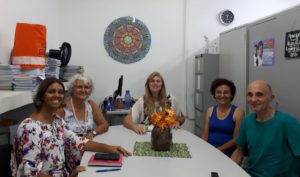
From left to right, teacher Valéria, Maria Aparecida N. Dias, Núbia Lira, Rosineia Fonseca and Rubens Salles.
Nubia – I have two years and four months here alone. I wasn't there any longer because it was another management. I was invited in 2017 to come here for the network and it's very temporal in terms of management too, tomorrow I don't even know if we'll be here. But what we see today: We dream from what we have, from what we see. I will speak specifically of Calumby. Yes, there is a feeling cultivated in the people who are in that space, in that place, an intentionally very good feeling and a practice being designed to fulfill this feeling of doing something for the child. We see this very strongly, the child being raised to its importance. We still have traditional remnants that the child is a being that is not yet, he will be, “Ah… he is getting ready to be an adult…” In fact, he is already whole. The perspective that we see in the Calumby experience, from what we know about the girls, we do not participate in the specific Waldorf training, but we see the result of the work that has been done with that team and with the children as something very valued by them and, therefore, by the children. We went to some activities and shared others. In this cultivation of the child's imagination, I saw how they worked with painting. What a beautiful thing! And we also went to say goodbye, at that moment they went to the other school (Cerimônia do Arco das Flores). And how that idea was built, together with the teachers, where the children themselves produced the elements of their farewell. How exciting this was for the families! The families crying, from being living that moment. I confess that I thought: “What is this mother thinking, why is she so emotional?” In that child's passage to another place that she will have, in the future, good things. That's what they always said. I thought like this: “I think mothers are thinking: I hope it is, I really hope it is.” It was as if they were creating hope in these children who need to have a better world. This is very clear.
And what I also think is very cool in this group of teachers, is that from this internal experience there is a very strong projection of this idea of defending the child, of building this world for the child, in the meetings they have with the teachers. from the other schools. When they arrive, they give some testimonials about their work and how the children deal with the work they do there, and then everyone is amazed: “Ah, so the work there is good!” This generates curiosity in other people. People realize that they feel fulfilled by doing that work with those children. This is the idea that becomes clear when they speak with great pride of the work they are able to do at that school, very exciting. This really excites other people, and when we think about the future, when experiences are shared, they also infect other people. If teachers are taking pride in their own work, then maybe it's because they're seeing kids getting happy with their work. I think that's what a teacher accomplishes, his job is to reach that person. It is very clear how they speak with pride.
Rubens - There's also the issue of parents being happy, isn't it?
Nubia – Yes, and believe. We saw the way everything was organized there, that the families stayed there with peace of mind. And some experiences at other schools we've been to are sometimes much more hectic. We realized that there was tranquility in that environment with those people, with parents, with other children. There is a relationship there with the community.
city – There is a lot of respect from parents for school work.
Nubia – There is one thing that is extremely positive that has been catching our attention. It's a question that we ask and that we realized is also asked by Waldorf Pedagogy: 'What can we do for this child and what is best for him?' And not what she has to achieve, here and now, as soon as possible, and she has to leave knowing this, that… objective things. And sometimes they are not concerned with how that child is forming. We have been defending this, but I think we have many steps ahead to reach this level.
As a network, we still don't see this process (how to expand the work done at Calumby to other schools), but the important thing is that it's being done with quality, with all the training work, because we understand that without continuing education we don't have a quality job, because the teachers are not fulfilled. But there is a difference there. What you do in continuing education is what really connects teachers to what is central to their work, which is the child. And other people realize how proud they are of being a teacher, and to be moved by that and say: We are on the way!
Rubens – The important thing about this experience is that it has enough strength to maintain itself, develop, consolidate itself, but you are really to be congratulated, because the atmosphere at school, the atmosphere between the teachers and the children is very good.
Nubia – It's much more of Cida and Paulo's responsibility and effort than ours, because we have 46 schools, and we can't handle it. We keep on dialoguing always, within the perspective that the school informs us and we try to meet their demands.
city – Everyone has their role, and there is great respect for the work, with a lot of support, and the work can happen and the teacher is respected.
Rubens – What is it like for you to have a different school in the network? Does it take more work in terms of management?
Nubia – No, quite the opposite. We have a team that is there for a very specific motivation and there is really no discomfort in that sense. There is a whole set of forces there, and as far as possible we try to accompany them. All sharing of experience, of good works, needs to be done, because it touches other people that this feeling is good to have. This feeling that we are managing to make our work the best for someone else, for the children, in this case, is very good, and step by step we move on.
Conversation with Ana Débora Lima França, Elementary School Coordinator, about EMEF José Souza de Jesus
The school's decision to adhere to Waldorf pedagogy was born from a collective desire, which began at Calumby, so that students who left there could continue to have teachers trained in Waldorf Pedagogy, in elementary school, and which also had a political decision so that happen. Today there is a collective effort to strengthen the initiative.
Cida tells us that, in the fifth grade, a boy asked to repeat his grade, so he wouldn't have to leave school.
Ana Débora – This is the most beautiful thing! Sometimes I arrive at school and ask: Isn't there a class? It's because of the silence! It is not what we are used to seeing in schools in general. They are all in their rooms doing some activity. We notice a difference, in the children, in the parents, even in the school doorman, very attentive to those who asked for some information. I can't say exactly why this difference, but that we notice it there, you see.
city – This increases the responsibility of the entire team involved with the school, we have to be very careful.
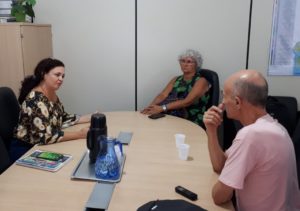
From left to right, Ana Débora L. França, Maria Aparecida N. Dias and Rubens Salles.
Ana Débora – In the beginning, there were no teachers from the network with public examinations to enter there, so they were the ones who had passed the selection process. But even in that we were lucky, because almost everyone who went there immersed themselves in the project, and those who didn't identify themselves asked to leave, and we solved it calmly. When we had a removal process, then other teachers wanted to be removed there, already knowing about the project, and that they would have to participate in the Waldorf training at Instituto Social Micael.
Today there are other teachers who want to do the training, but continuing in their school of origin, without having to leave their units. In a way, I think it's good, because it's the seed that is being taken, and it strengthens this collective of teachers who feel the need to apply this practice in their school. We may not even have the whole school, but just having a teacher working with the principles of Waldorf Pedagogy I think it is very good (she mentions the names of some teachers who are in this group, in different schools). So we have this experience of people who are exercising these practices (rhythms, flute, drawings, watercolors, etc.), and who, if they have space, begin to transform the environment. They don't just transform their living room, they even transform their relationship with their families. So it's important to have these 'hummingbirds' carrying this pollen!
Interview with Maria Cecília Tavares Leite – Secretary of Education
Maria Cecilia – Waldorf Pedagogy came to the network, not because of a management proposal, but from a collective of teachers who trained in Waldorf Pedagogy, and proposed to implement it in that school. So, the school is already directed to this pedagogy. To get to know the pedagogy and implement it, the management is not having difficulties, because there are no pedagogical concerns for us to interfere in the school. We participate, support, discuss, dialogue, it is always a very rich moment of discussion and exchange of experience. It has been a very, very, very interesting experience, and the main observation of this experience is in the students and the teachers. When we visit Calumby School, inspired by Waldorf Pedagogy, and visit another school, you feel the difference in those relationships established there. They are relationships of trust, exchange, sharing, belonging. Students feel the school as their own, the community and family feel the school as their own. This is very good in a moment of lack of identity, when no one sees themselves in any space.[…] Regarding the experience we saw in São Paulo, at the Horizonte Azul Resilience School, I was delighted. I still don't see myself in that experience, because it is already on a much more consolidated path. It has a different path and is a unique experience, but we hope that these basic principles of human development will be implemented and consolidated in Aracaju, yes.
Watch the full interview
Jose Americo de Menezes
Professor Dr. from the Federal University of Sergipe
americo – ISM invited me, as a professor at UFS, to add and plan together the political pedagogical project of the school (Calumby), since, through UFS, I could add projects, via extension projects, research projects. […] Waldorf Pedagogy contemplates aspects of the human condition that I have always missed in discussions from the point of view of the pedagogical currents that commonly exist. This for me, as a teacher, has been something very important, because it has given new inspiration to my teaching process.
Watch the full interview
EMEI Dr. José Calumby Filho
Address – Rua 15 no 210 – Neighborhood: 17 de Março
CEP: 49.044-000
286 kindergarten and day care students
Antonielia Ribeiro Santos Fontes
Professor Antoniélia, one of the pioneers of the Aracaju public network to train in Waldorf Pedagogy, was the first director of EMEI Dr. José Calumby Filho, and tells us how she became a Waldorf teacher, and about the process of implementing pedagogy at EMEI Dr. Jose Calumby Filho.
Watch the full interview
Antonielia Ribeiro Santos Fontes
Professor Antoniélia talks in this video about the integration of teachers who do not know Waldorf pedagogy, in a public school, and other challenges.
antoinelia – Waldorf Pedagogy in the public network is essential, because it restructures the human. This is as true for the education of the child, and, I will tell you, it is much more true for professional education. The teacher needs this medicine, this balm, which is to believe in what he is doing. If he doesn't believe it, he won't go on.
Watch the full interview
Marcia Soares Ramos Alves - Educational coordinator
There is (in Waldorf Pedagogy) a very scientific observation of this child and this environment that is created to involve this child, and leave him with autonomy to develop, which is very good for him. That's what brought me here, and I see that this is also reflected in the community, in the child's parents, in the family.
Watch the full interview
Simone Lima – director
The process starts with us. I started to change. When I got to know Waldorf Pedagogy I started to have a new look, my look opened a little more on education, but before it opened on education, it opened on me. I improved as a human being, I improved as an educator, and I am in this process. This process is long, it is a process of study and internal and external observation. […] I feel that our reception is a differential. With the same attention and love that we care for children, we care for parents and guardians, and they feel welcome, they are happy and grateful for having this respect. Our community is very needy, and they need that respect.
Watch the full interview
Maria Jose Vieira de Almeida - teacher
When I arrived at this school and was told that it worked with Waldorf Pedagogy, I took a deep breath and thought, “Thank God someone thought of children!” They must first go through the process of feeling like a child, recognizing themselves as a child [...] Before children know letters, blackboard and chalk, and imposition of assigned subjects, be children before that, create, think, recreate their world , and live their world first, because then everything becomes easier when they move on to letters and numbers.
Watch the full interview
Mayra Cristina Oliveira de Araujo - teacher
In the day-to-day of the classroom, what I realize that Waldorf Pedagogy has brought me, first of all, is that I respect and look at the child, because before I did work more focused on what the child had to learn, what she had to do, and I didn't look at what the child needed. And the act of accompanying the child, from 3 to 5 years old, gives me a tranquility, a firmness, which the child needs at each stage. It's something I think is fantastic, and, regardless of Waldorf pedagogy, if I were to give advice to other early childhood teachers it would be: “Follow your class”.
Watch the full interview
Cassia of Fatima – resource room teacher for special children
Waldorf Pedagogy for me was a reconnection with nature and with what I had most genuine. With my grandparents I always liked stories, playing with nature, with the simplest things in nature, and my arrival at Waldorf Pedagogy was as if I had reconnected some things that had been disconnected. What has changed is finding the path of simplicity and more human, because it respects the limits of each one. […] I see this school as a possibility to provide people with opportunities, because there are so many beings that have enormous potential, and maybe, in another place where they didn't respect their rhythms, their way of being, maybe that would be denied. I see here a place that can collaborate so that these people can be who they are, and show their potential.
Watch the full interview
Photos
Calumby wall pictures
EMEF Jose Souza de Jesus
Address – Neighborhood: March 17
Elementary education from 1st to 5th year
443 students
Xislene Santos do Nascimento - 1st year teacher
Every time you get to know Waldorf Pedagogy more deeply, you are enchanted, and it brings peace to us. Every time I participate in the course, I leave spiritually renewed, more excited, with more self-esteem, believing that I will make it, with more hope. I think it's amazing, I really like it.
Watch the full interview
Cleide Selma da Hora Santos - 2nd year teacher
Celebrating birthdays is the most beautiful thing in the world, because many do not have this opportunity at home. Last year, I had a student who was very withdrawn, always in his corner. Then, on his birthday, I just put on the blackboard: – Congratulations! But I didn't put the child's name. It was the most exciting birthday. They all behaved and asked: – Who is it? Who is it? Then the birthday boy himself said: – I think it's from Gláucia. - I think it's so-and-so. He didn't even know! Then when I said the birthday verse and took his little hand with the crown, it was an emotion, because most of the children cried. Some invented that they were crying with nostalgia for their father who died, or a little cousin who died, but everyone was in the same emotion. And the other day, when I made the wheel, look at him in my lap! And he had never come to the wheel!
Watch the full interview
Rivânia Rocha – coordinator
I already feel a good difference in the relationship between the students. The rate of violence, of friction, here is very low. It is a quiet school to work in, and everyone who passes by, like the surveillance staff, the general services, they feel that, they say that the school is quiet, that they have worked in other schools and feel that it is different here. And I see that too, because I come from other schools, I have fifteen years in the profession, and I think the trend is to improve and expand. I believe it would be very interesting for the network to implement Waldorf Pedagogy in more schools.
Watch the full interview
Rita Nilda Santos de Santana - teacher
I identified with Waldorf Pedagogy because it is the way I thought education should be, not only in public schools, but also in private ones. The child being able to be free to learn in her time, and in her space, is what makes me still in education. I took the first module of Waldorf Pedagogy, and then I was even more delighted. How can we discover small details that we don't notice when we use that traditional school, and that at Waldorf we see! How can we teach differently! It was what I wanted for myself! I discovered this Waldorf world and I want to be in it.
Watch the full interview
Beatriz Lima Andrade - teacher
When I arrived at Calumby, how different it was! The welcome: “Welcome! Teacher little bird, to your nest!” I thought: Guys, how fun! The coordinator already received me like this, unlike the other schools where I entered. She already received me in the playful, we not only pass the playful to a child, she passed it on to me and I'm already on this path. We had a pedagogical planning meeting, and then we did the circle like we do with children, the dance, the winter circle, and she showed me what it was like, with the rain, the wind and all the staging. From us to adults, to children. So this is very interesting, very interesting. If everyone is aware, is together and walks together, it's a dream, right? It's a dream, it's very different from what we see out there.
Watch the full interview
A School Museum!
In addition to all the pedagogical work and training of Waldorf teachers, the Instituto Social Micael also undertook an action in partnership with the Federal University of Sergipe and the Municipality of Aracaju, to create the Museu Escola project, developed in the two schools in the 17 de March.
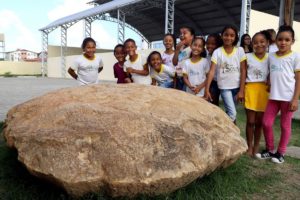 EMEI Dr José Calumby Filho and EMEF José Souza de Jesus received three pieces of colonies of fossilized bacteria, called thrombolites, existing on the planet for more than 80 million years and which helped in the production of oxygen. The pieces were donated by the Municipality of Rosário do Catete. In Sergipe there is a region that is very rich in fossils, and the objective of the project is to allow children to experience this knowledge and understand a little more about the evolution of the planet and the history of Sergipe.
EMEI Dr José Calumby Filho and EMEF José Souza de Jesus received three pieces of colonies of fossilized bacteria, called thrombolites, existing on the planet for more than 80 million years and which helped in the production of oxygen. The pieces were donated by the Municipality of Rosário do Catete. In Sergipe there is a region that is very rich in fossils, and the objective of the project is to allow children to experience this knowledge and understand a little more about the evolution of the planet and the history of Sergipe.
city – With that, we can bring many possibilities of contents of geography, science; make the child develop a broader thinking in the school day and, who knows, arouse interest and inspire future scientists and archaeologists.
Photos
Precious tips from a lot of experience
For those who would like to fight for the implementation of Waldorf Pedagogy in the public network, it is very important to know some tips from Maria Aparecida and Paulo do Eirado, which you can access below in text or video. They have a lot to teach us.
Interview with Paulo and Cida– pdf
video interview


